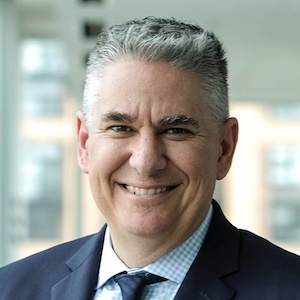NPR to end local versions of ‘Consider This’ podcast

April Simpson / Current
NPR’s effort to create a podcast that merged national and local news will end less than two years after it launched, the network told Current.
Consider This combines stories from NPR’s All Things Considered newsmagazine and news segments from 12 participating stations. Listeners in 10 markets have been able to hear localized versions of the show six days per week, but that will end Sept. 2.
Localization “didn’t prove sustainable,” NPR spokesperson Isabel Lara said in a statement.
The podcast, which was developed from the Coronavirus Daily podcast in June 2020 and introduced local versions in September 2020, will continue as a national podcast.
The localized podcasts have been available in Philadelphia; Dallas; Minneapolis; Chicago; Boston; San Francisco; Los Angeles; New York City; Portland, Ore.; and Washington, D.C. News stations in Boston and Los Angeles collaborated to localize the podcast for listeners in their markets. NPR had hoped to offer the podcast with local segments in more cities.
But Joel Sucherman, NPR VP of audio platform strategy, said the workload and technology required to localize the podcast had become “more and more difficult to do” on a daily basis. “The production really hinged on a couple of people doing a lot of manual work on the NPR side using ad technology … to do something that it was not really intended to do to begin with,” he said in an interview with Current.

NPR used AdsWizz to deliver localized news in the same way podcast publishers deliver localized sponsorship messages.
From the very beginning, NPR knew that using the ad-insertion platform to localize Consider This “was really pushing the technology to the limits,” Sucherman said. The system uses listeners’ IP addresses within Nielsen-designated market areas to deliver a package of national and local news.
“Our hope was, over the course of time, a number of things might make it easier,” Sucherman said. “The technology might change on the ad tech side. The podcast platforms themselves might embrace the idea and make it easier to do that.”
When those changes didn’t come, “it put a lot of pressure on people,” he added.
NPR also learned that the production process wasn’t scalable, said Eric Marrapodi, VP of news programming. Producers had to “stitch together” individual files and “upload it as a specific file to the ad server,” he said.
The process “was ripe for user error,” Marrapodi said. “It’s not to say it happened a lot, but it was a process that led to those possibilities.”
Expanding localization to every NPR station “would have meant doing that stitching individually,” Marrapodi added. It wasn’t feasible to hit the deadlines that would be required to get more localized podcasts “out into the world at the right time.”
Another complication is that NPR is going to begin using Spotify-owned Megaphone for its podcasts. The system doesn’t work the same way as the current one, Sucherman said. “So we just had to make the difficult decision to deprecate the national-local versions of Consider This,” he said.
During the trial, NPR didn’t see evidence that localized versions of Consider This were “any more of a hit with the audience,” Sucherman said. In the markets where localized podcasts were available, “there was no evidence to suggest that … more people were listening, more people were more deeply engaged,” he said. “So it wasn’t necessarily making an increased impact with the audience.”
When Consider This transitions to being only national, listeners in the markets with localized versions will not notice major differences to national elements of the show. The podcast will be shorter, and promos teasing the local content will be gone. “We do think there’s going to be some opportunity for growth for the podcast by getting into the stories quicker with fewer promos at the top,” Marrapodi said.
NPR still believes that creating a national-local content experience is a sound strategy, Sucherman said. NPR is “very actively thinking about how we can duplicate this in other ways that are sustainable, that are extensible to the entire system,” he said.

One way could be through NPR One, which drives 20% of the traffic to Consider This, he said. “That’s a place where, with some additional work on the toolset for curation, we hope to be able to find ways to marry the national and local content for Consider This,” he said.
Still, it’s not the outcome NPR’s content leaders hoped for when they put out the podcast in 2020. “This stinks. This is a bitter pill,” Marrapodi said. “We really wanted this to work. And this was a big, big swing to try to do this.”
“We have to keep taking big swings,” he said. “If we’re going to be successful as a collective, as a group of stations, as an NPR network, we’ve got to keep taking big swings … even when things don’t work out.”
Station reaction
Station executives whose newsrooms participated in localization described positive outcomes from the project.
At Boston’s WBUR, the podcast “was not a business success. But a lot of good things came out of it,” CEO Margaret Low said in an email. Teams at WBUR and GBH collaborated on the podcast and “worked really well” together, she said.
The project also helped demonstrate the need for local news podcasts, she said. An early survey of Consider This listeners “underscored that this digital audience existed, and they wanted Boston news,” she said.
That was an “important discovery,” Low said, and prompted the station to develop its own local news podcast, The Common, last fall.
KQED in San Francisco has had “success” with the podcast, said CCO Holly Kernan in an email. “So of course we’re disappointed that it’s being discontinued.”
Kristen Muller, LAist CCO, said in a statement that producing the podcast was a “positive experience.”
“We enjoyed having a national/local daily podcast, which complemented our other daily local pods, The LA Report and How to LA,” she said. “We partnered with KCRW to make the show, which fostered deeper collaboration, and the audience was meaningful to us.”
The three station leaders said NPR’s decision will not affect their staffing.
Correction: An earlier version of this story incorrectly reported that NPR had begun using Spotify’s Megaphone for its podcasts. NPR has not yet made the change.






